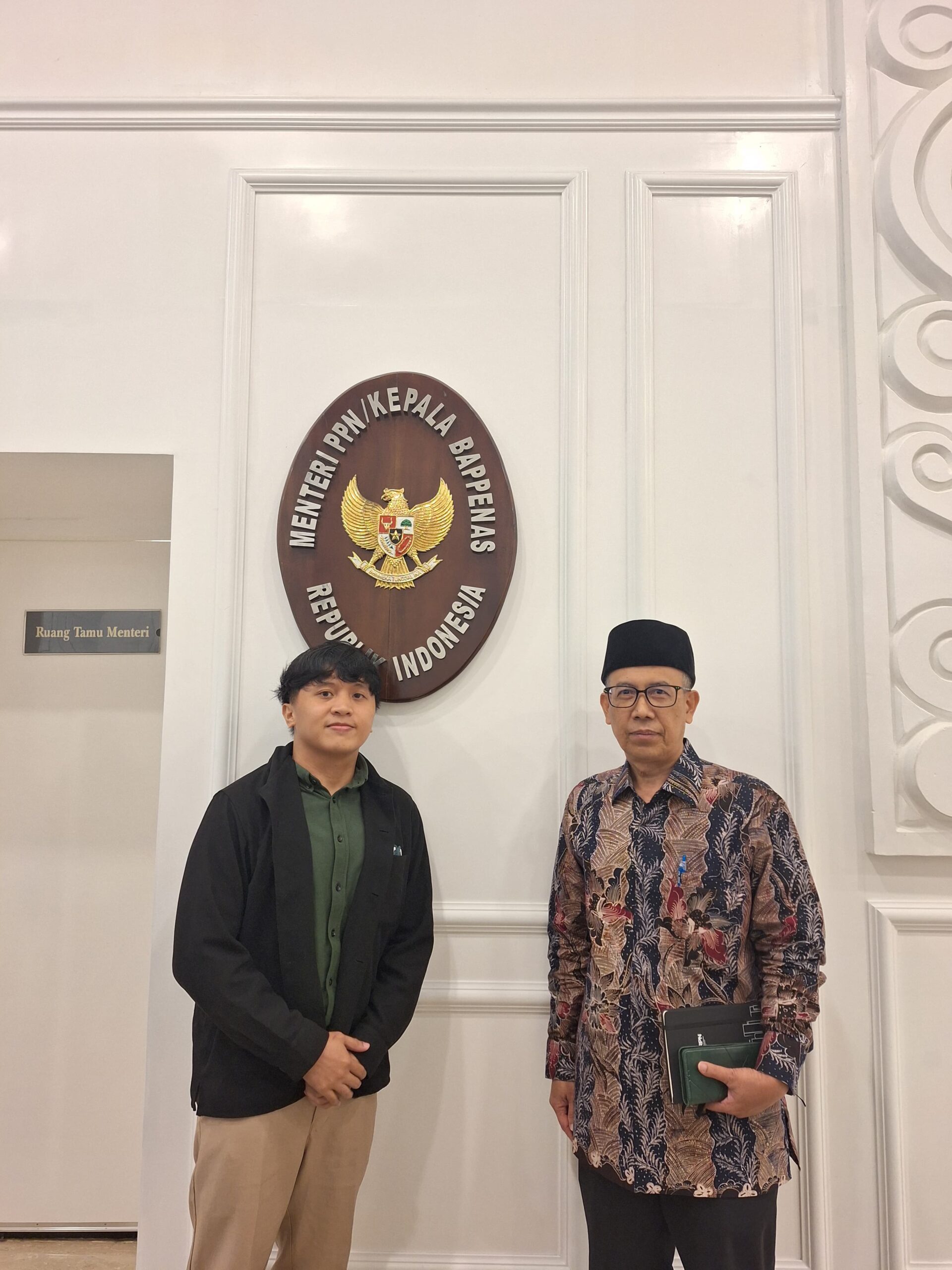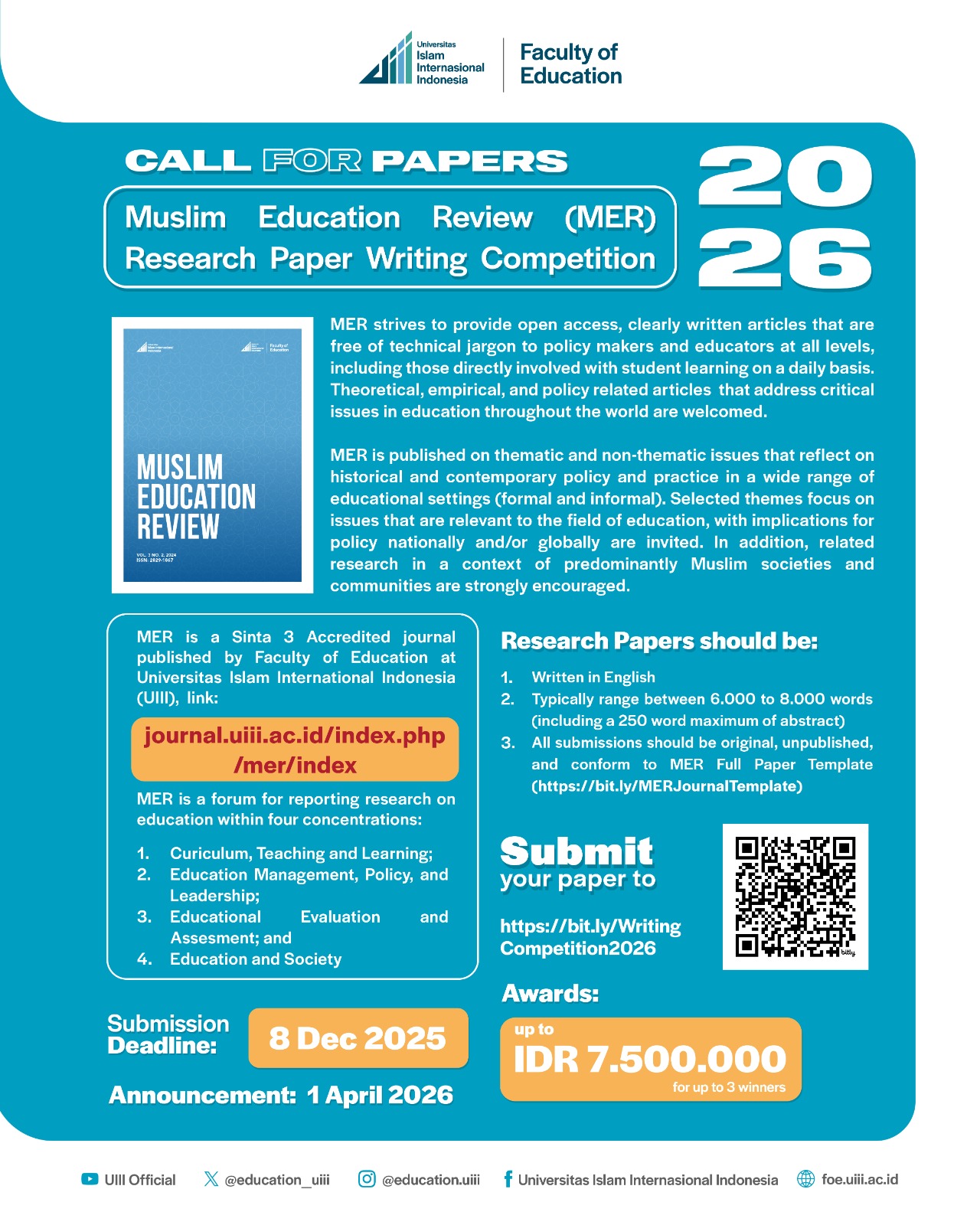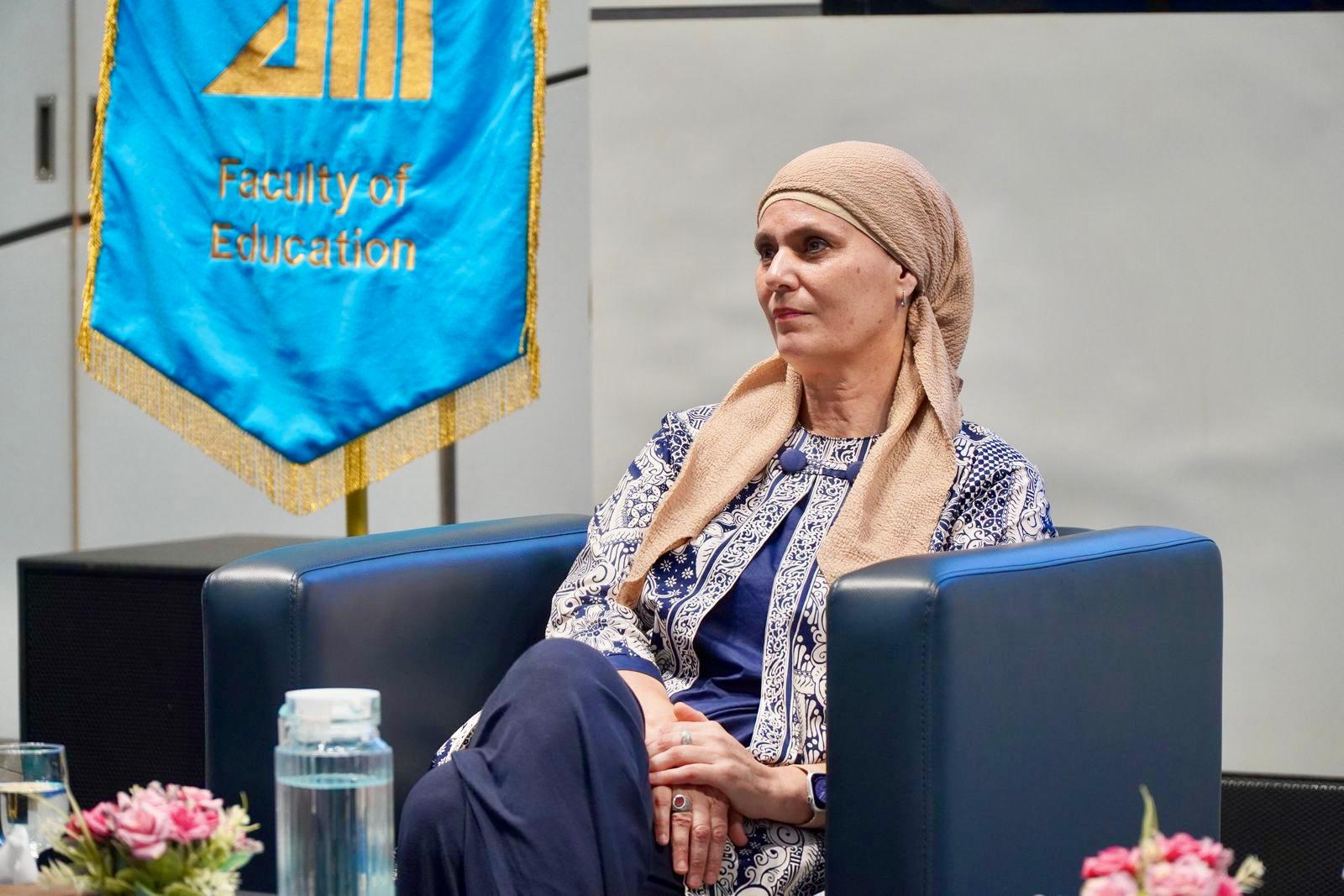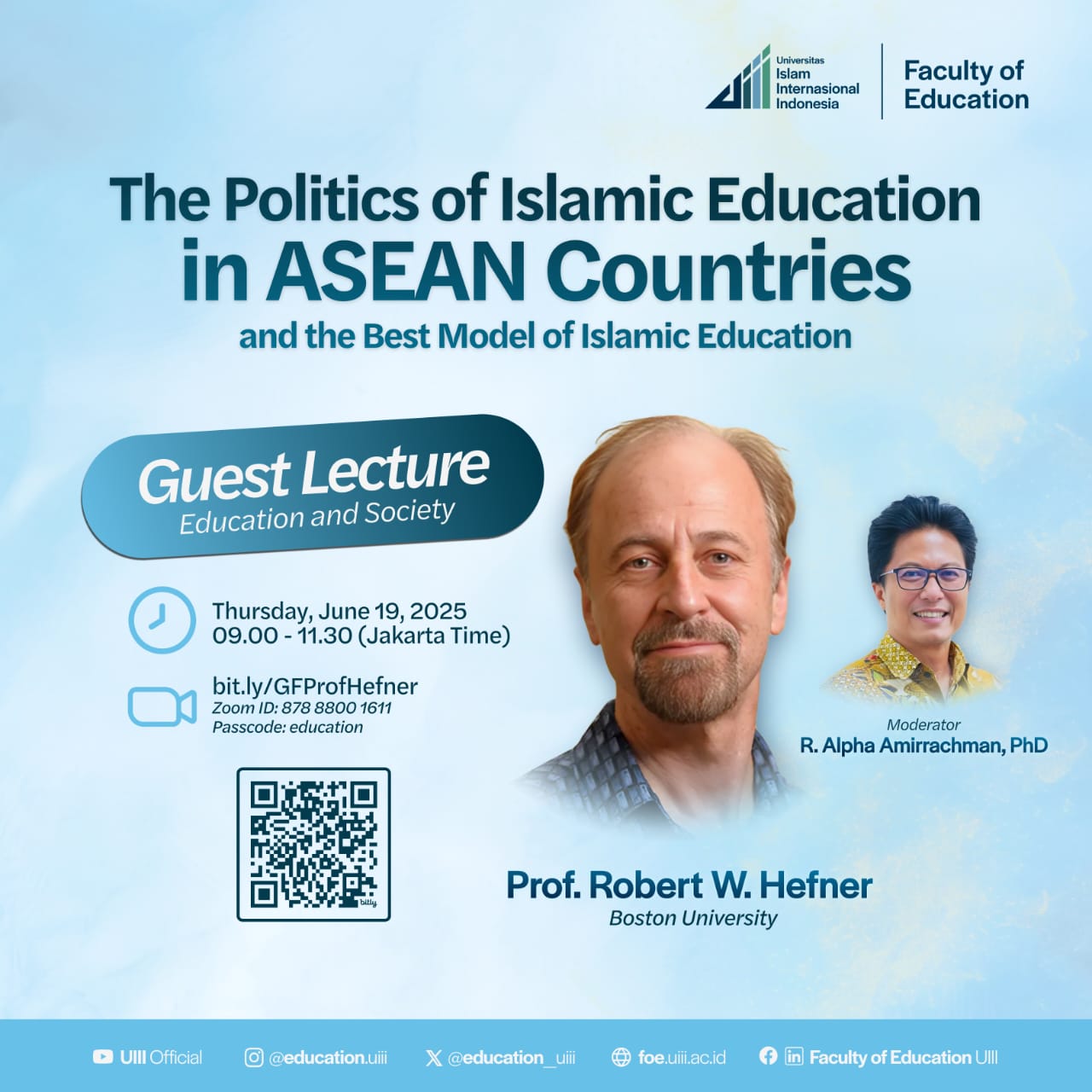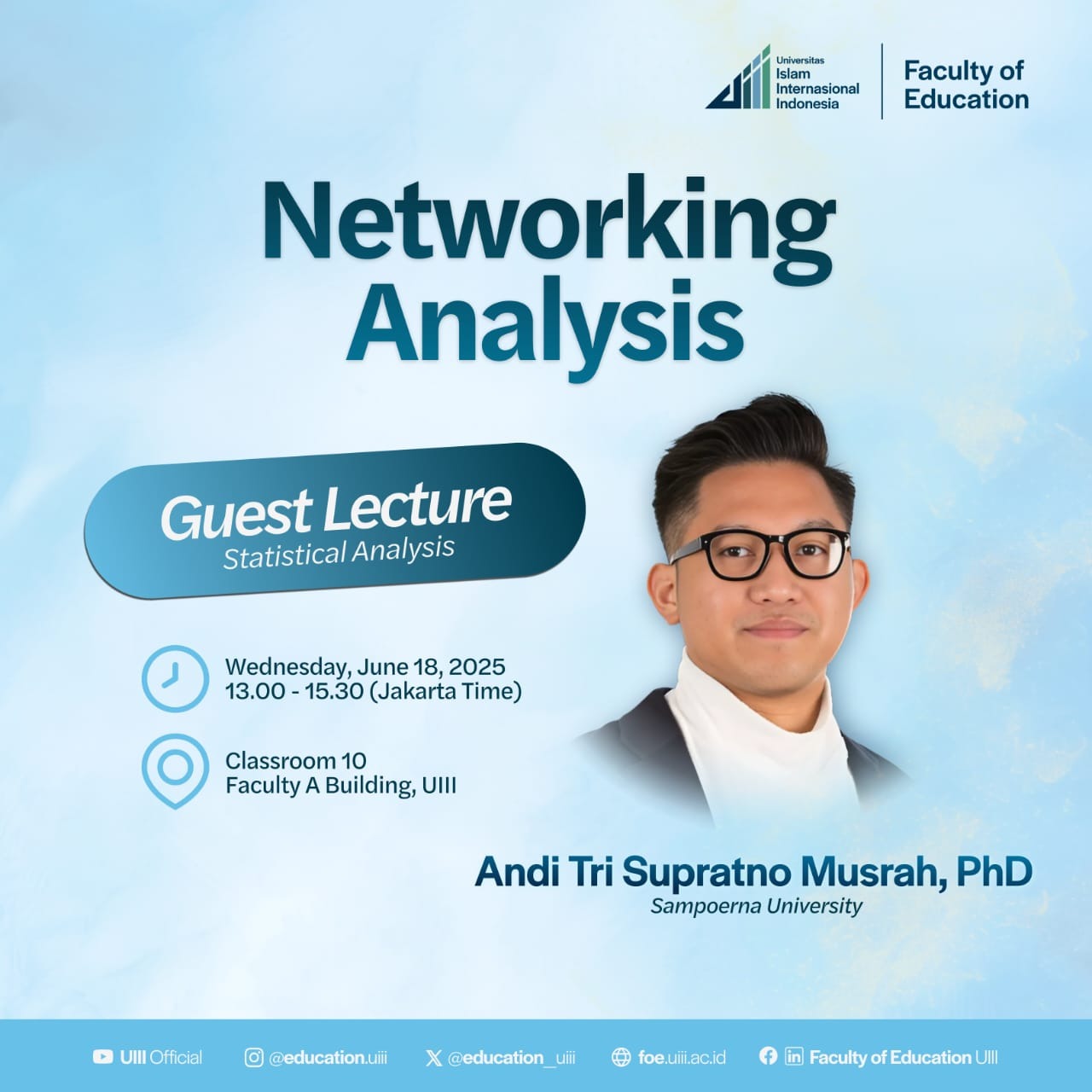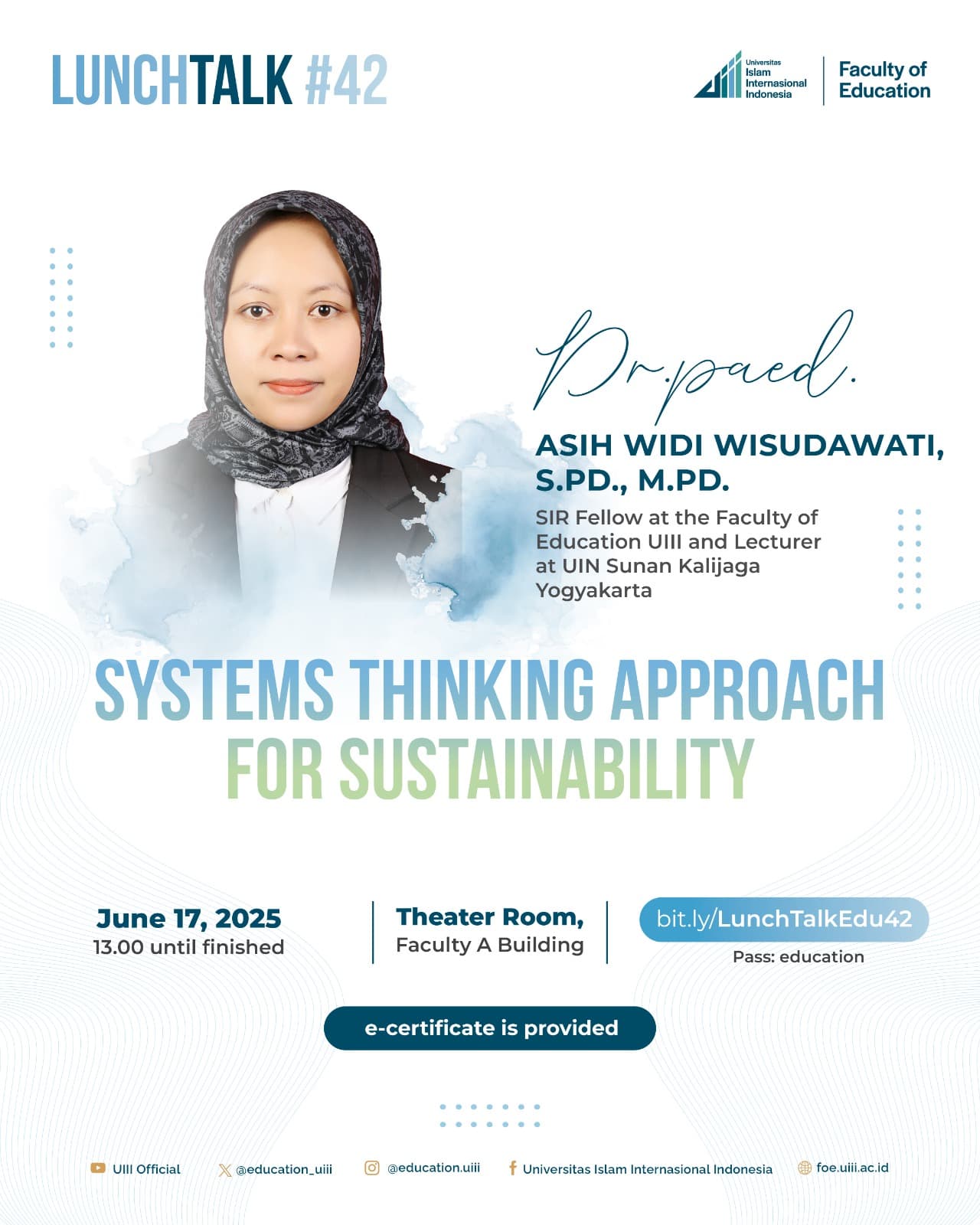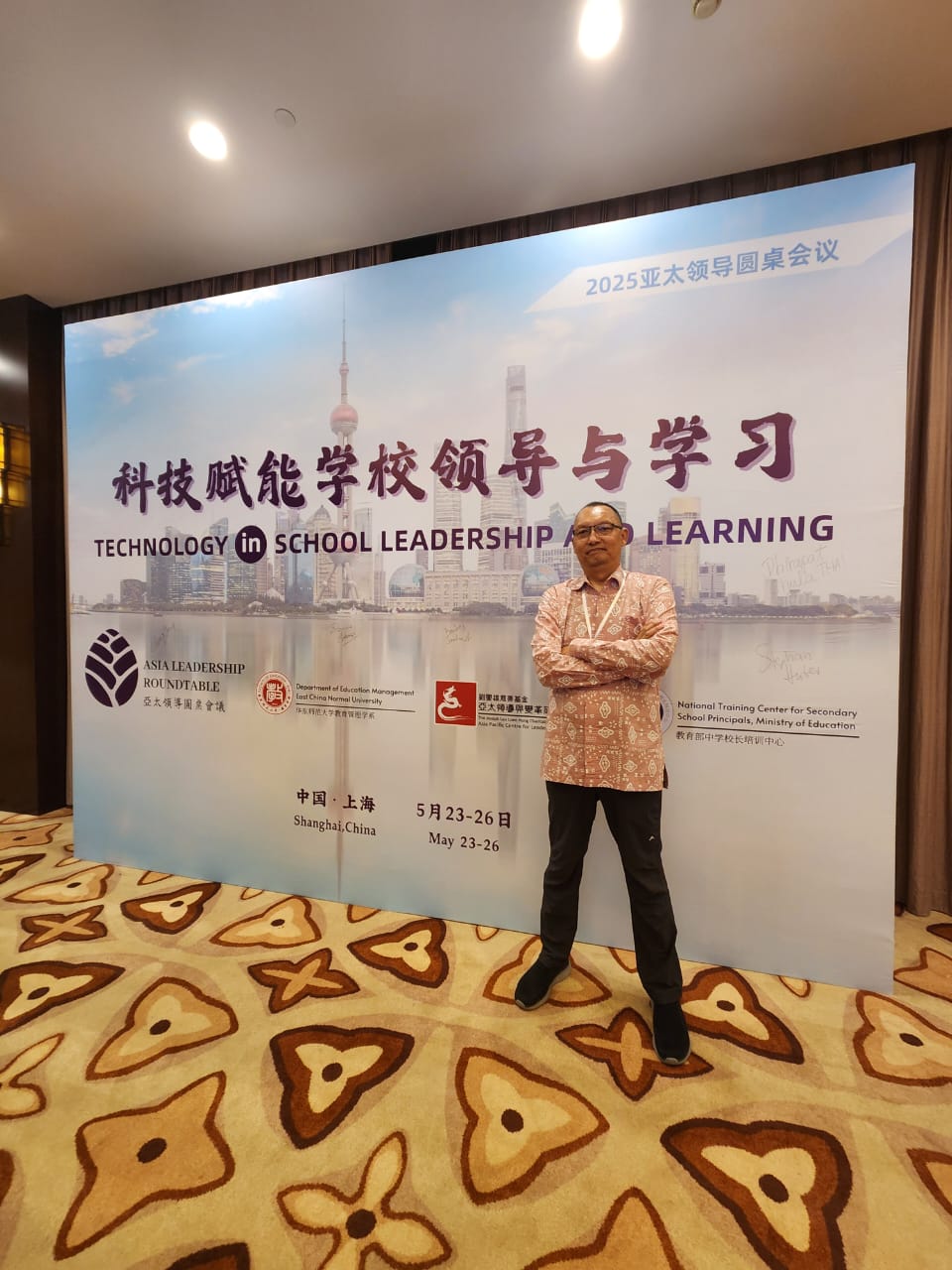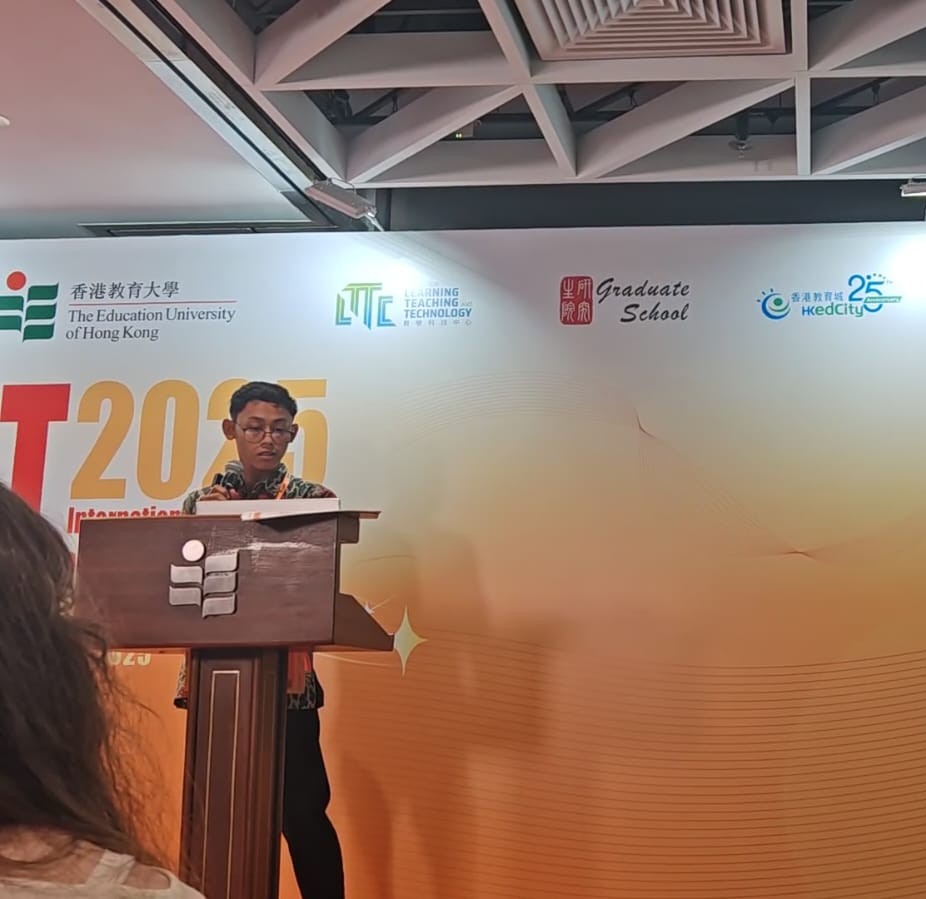Education and Society - Study Visit to Bappenas
 Education and Society - Study Visit to Bappenas
Education and Society - Study Visit to Bappenas
by Ihsan-Isah Imam Zaman
On Tuesday June 17, 2025, the Batch 4 MA students of the Faculty of Education at Universitas Islam Internasional Indonesia (UIII) have successfully conducted their study visit to the Ministry of National Development Planning, also known as Badan Perencanaan Pembangunan Nasional (BAPPENAS). This wonderful opportunity is largely thanks to the strong collaboration between BAPPENAS and UIII in their efforts to improve the quality of higher education and research in Indonesia. This study visit is part of the learning experience of the students that will help them gain an improved understanding of the course Education and Society.
As a Muslim-Filipino who has been fortunate enough to be part of the Faculty of Education in UIII, I am very grateful to have been part of this learning experience. Personally, I have not even been to the equivalent government agency of BAPPENAS in the Philippines. That is why I could not help but try to maximize the experience as much as possible. As an aspiring researcher interested in policymaking, education and research in national level, this study visit has been quite rewarding and beneficial.
The study visit has reminded me of when I was applying to UIII as a postgraduate student. When I was writing my motivation letter, I was trying to bare my passion and dedication to the common good through my writing. Somehow, I find myself consistent in my belief that education has really powerful impact in turning the life of an individual or community for good. Without a single doubt in my mind, I strongly believe in the power, importance and value of teachers and educators in improving the condition of society and empowering individuals.
From my personal encounters in my country, I have seen firsthand how expensive it is to be poor, especially in education. I have observed how some marginalized people seem to have been forgotten by the vast majority. Despite the existing government policies, there seems to be no improvement at all. I used to wonder if it is simply a phenomenon of social apathy or some communities are just bound to experience social exclusion. These reflections may not fully represent what truly drives me to pursue higher studies, but one thing I have realized is that I need to learn more— because passion and intention alone cannot bring about tangible change.
In the faculty of education, it is mandatory for the MA students to take the course Education and Society. In this course, we are learning about the relationship between education and other disciplines that contribute to social development and shape social progress. We learn how politics, culture, society and religion influence education and also how education affects them in return. To be honest, this course has truly helped me develop a more structured way of thinking about the factors that affect education. Prior to starting my postgraduate study, the way I think was often either too one-dimensional or too scattered. Somehow, I knew that there were various factors at play but my grasp of them was still immature.
 Talking more about the study visit, we first went to the gallery of BAPPENAS. Inside the gallery, we have been captivated by the simple but meaningful displays that help us visualize the past, present and future endeavors of BAPPENAS. During that brief tour, we have been introduced to the key events and figures of the ministry. The artistic representation of their works is all interesting but what caught my attention the most was the section about Blue Economy. This concept is relatively new for me and even in the Philippines this is still in emerging stage.
Talking more about the study visit, we first went to the gallery of BAPPENAS. Inside the gallery, we have been captivated by the simple but meaningful displays that help us visualize the past, present and future endeavors of BAPPENAS. During that brief tour, we have been introduced to the key events and figures of the ministry. The artistic representation of their works is all interesting but what caught my attention the most was the section about Blue Economy. This concept is relatively new for me and even in the Philippines this is still in emerging stage.
Why did I get hooked on the Blue Economy when I should be focusing on issues and trends in Education? I guess it is because, in some way, this concept speaks to my identity. First of all, I am from a tribe whose name is derived from a term that means ‘The people of the lake’. Then growing up, I keep hearing the stories about my grandparents being fishers. My father used to help my grandfather fish for a living, which helped support his and his siblings’ education. People do not choose the circumstances or reality that they will be born into, but the social contract demands that those who take on political power have a responsibility to craft and implement policies that support people from all walks and conditions of life. In this regard, education plays a crucial and irreplaceable role.
Afterwards, we also had a brief but comprehensive lecture from BAPPENAS about the process of education policymaking, which involved not only rich theoretical discussions but also practical insights. There were a lot of topics covered and my batchmates raised interesting questions that were appreciated by the experts for their critical relevance. I would like to highlight the topic about out of school children because it is quite an important issue in education especially when we talk about the idea of no child left behind or better yet, no one left behind. In our first semester, I used to talk about juvenile delinquency and out of school youth which I previously struggle to find similar topic about in Indonesian context. Thanks to this session, I found out that similar topics are being studied by some of my batchmates and it also align with the current efforts of BAPPENAS. From my perspective, the impact of social exclusion can be felt from as early as childhood. This is why there are more researchers highlighting the importance of early childhood education.

Our batch is truly grateful for the iniative of the Faculty of Education and our lecturer in this course, Dr. Amich Alhumami, Ph.D, who also serves as the Deputy Minister for Human Development and Cultural affairs. Placing this session near the end of the course and semester has helped us connect theoretical insights with practical experience. I have come to understand more clearly that the broader the scope of the research, the more it needs not only a high level of expertise, but also empathy and a strong sense of humanity. The greater the scope, the more people are involved, and the more lives affected by its outcomes.
Call for Papers: Writing Competition 2026
 Call for Papers: Writing Competition 2026
Call for Papers: Writing Competition 2026
MER is a Sinta 3 Accredited journal published by the Faculty of Education at Universitas Islam Internasional Indonesia. We invite a wide range of topics in education especially those that are within the journal scopes.
MER is a forum for reporting research on education within four concentrations:
* Curriculum, Teaching and Learning;
* Educational Management, Policy and Leadership;
* Educational Evaluation and Assessment;
* Education and Society.
Submission papers should be written in English and typically range between 6,000 to 8,000 words (including a 250 word maximum of abstract).
All submissions should be
* Original;
* Unpublished;
* and Conform to MER Full Paper Template: https://bit.ly/MERJournalTemplate
Submission link: https://bit.ly/WritingCompetition2026
Awards
The awards include cash payment of up to IDR 7.500.000 for up to 3 winners.
Important Dates
Full Paper Submission: December 8, 2025
Awards Announcement: April 1, 2026
To see previous MER publication, please click this link: bit.ly/MERJournal
Beyond Science: Prof. Anna Gade’s Vision of Sustainability in Higher Education
Beyond Science: Prof. Anna Gade’s Vision of Sustainability in Higher Education
June 11, 2025
Contributor: Supriyono | Editor: Dadi Darmadi | Photo: Virda Lalitya Umam
In an engaging Lunch Talk #41 at the Faculty of Education titled “Environment & Sustainability in Higher Education: Theory and Practice,” Prof. Anna M. Gade, a Visiting Professor at UIII from the University of Wisconsin-Madison, USA, challenged conventional narratives around environmental studies and sustainability in academia, reflecting critically on the origins, definitions, and future directions of environmental education.
Starting with a narrative familiar to North American academia, Prof. Gade traced the roots of environmental studies to the field of environmental science, a discipline often grounded in natural resource management and natural sciences such as chemistry, biology, and earth sciences. However, she highlighted a critical limitation of this framing: the absence of people.
“The interaction of biotic and abiotic factors is how environment is formally defined. But where are people in this picture?” Prof. Gade asked a provocative question, as she portrayed a slide of a picture of mangrove forest in an Indonesian beach describing what environment is. This question underscored a persistent tension in environmental education the divide between scientific and humanistic approaches.
She argued that environmental studies must go beyond science to encompass humanities, social sciences, ethics, and cultural understandings, particularly for regions like Indonesia, where local knowledge and community practices shape environmental realities. She emphasized that even though the terminology of “environment” might seem recent, its conceptual roots, especially within Islamic traditions, reach back centuries.
A key takeaway from Prof. Gade’s talk was her assertion that environmental studies are fundamentally interdisciplinary. “It’s not just about adding people into the mix of natural sciences,” she said. “It’s about genuinely integrating diverse fields — from theology to engineering, from ethics to biology — to form a comprehensive understanding of our environmental challenges.”
Using the powerful symbol of the tiger, she illustrated how the survival of charismatic species like the Sumatran tiger is interwoven with cultural practices, local governance, and community relationships with nature. This, she argued, is where humanistic disciplines like religious studies and ethics become essential partners to science in environmental education.
Prof. Gade also critiqued the emerging discourse around sustainability, a concept whose foundations lie in international development, business, and systems thinking. She questioned the reliance on frameworks such as the Brundtland Report or simple lists of Sustainable Development Goals (SDGs), noting that while these offer practical guidance, they often lack deep ethical grounding.
“Sustainability becomes more than just an unstable word,” she reflected. “It calls us to consider our obligations to future generations, to rethink systems of production, and to integrate complex social, economic, and environmental considerations into our curricula.”
Prof. Gade’s presentation was not only an academic reflection but also a provocation for UIII and other universities in Indonesia. She urged educators to design programs that are genuinely interdisciplinary, that draw on Islamic intellectual traditions, and that embed ethical reasoning into environmental and sustainability studies.
Her message was clear: to address today’s environmental crises, higher education must not merely replicate models from the Global North but must cultivate approaches that are locally grounded, ethically robust, and inclusive of diverse worldviews. This aligns perfectly with UIII’s commitment to integrating global insights with local and Islamic perspectives, ensuring environmental education is both meaningful and transformative.
source: https://uiii.ac.id/beyond-science-prof-anna-gades-vision-of-sustainability-in-higher-education/
Guest Lecture: The politics of Islamic education in ASEAN countries and the best model of Islamic education

Join the Education and Society guest lecture session with Professor Robert W. Hefner (Boston University) under the topic "The politics of Islamic education in ASEAN countries and the best model of Islamic education" on:
Day/Date: Thursday, June 19, 2025
Time: 09.00-11.30 AM (Jakarta Time)
Online participation
https://bit.ly/GLProfHefner
Lunch Talk #42: Systems Thinking Approach for Sustainability

You are invited to join the Lunch Talk #42 at the Faculty of Education, UIII
Dr. Paed. Asih Widi Wisudawati, S.Pd., M.Pd. (SIR Fellow at the Faculty of Education UIII and Lecturer at UIN Sunan Kalijaga Yogyakarta) will share about: "Systems Thinking Approach for Sustainability".
Systems thinking approach for sustainability aims to (1) enhance the meaningful, mindful, and joyful learning as mandated by Indonesian Ministry of Education in the form of Deep Learning; (2) help students develop higher order thinking skills to understand and address a complex, interdisciplinary, and real-world problems, (3) formulate recommendations to guide use of Systems Thinking in science education integrated to other disciplines.
Day/Date: Tuesday/June 17, 2025
Time: 13.00 until finished
Place: Theater, Faculty A Building
Online participation:
https://bit.ly/LunchTalkEdu42
E-Certificate is provided
Thank you!
Recorded on YouTube
https://www.youtube.com/watch?v=zIOrR6cu8JE
The Global Ikhwan Women’s Experiences in Polygamous Marriages in Malaysia: Polygamy as Means to Be Closer to God
 Nurmila, N. (2025). The Global Ikhwan Women’s Experiences in Polygamous Marriages in Malaysia: Polygamy as Means to Be Closer to God. In: Othman, N., Nadarajah, Y., Mohd Isa, R. (eds) Polygamous Marriages in Peninsular Malaysia. Springer, Singapore. https://doi.org/10.1007/978-981-97-9104-0_12
Nurmila, N. (2025). The Global Ikhwan Women’s Experiences in Polygamous Marriages in Malaysia: Polygamy as Means to Be Closer to God. In: Othman, N., Nadarajah, Y., Mohd Isa, R. (eds) Polygamous Marriages in Peninsular Malaysia. Springer, Singapore. https://doi.org/10.1007/978-981-97-9104-0_12
Abstract
As one of the ways to recruit more membership for Global Ikhwan and to counterbalance the negative image of polygamy, Global Ikhwan launched the Polygamy Club on 15 August 2009. This chapter will elaborate the Global Ikhwan women’s experiences of living in polygamous marriages. Based on my interview with 14 Global Ikhwan members consisting of 3 polygamous husbands, seven first wives and four second wives, this chapter shows that all polygamous marriages among Global Ikhwan members were arranged by their leader, Buya Ashaari. All of the research participants have communal life arrangements, in which each member contribute economically to the jama`ah (the community of the Global Ikhwan) and in return, their basic needs are fulfilled by the Global Ikhwan.None of the wives receive maintenance from their husband, reducing economic conflict among the wives. However,this does not mean that the wives have no problem in their polygamous marriages. They must suppress their feeling of jealousy and in doing so, they were trained by their leaders to overcome this feeling by trying to be closer to God, “cleaning” their “selfishness” to have their husband for only herself.
Asia Leadership Roundtable: Expanding Networks and Advancing Knowledge
Asia Leadership Roundtable: Expanding Networks and Advancing Knowledge
by Bambang Sumintono
During my tenure as a lecturer at the Institute of Educational Leadership, Universiti Malaya, Malaysia, I was invited to attend the Asia Leadership Roundtable (ALR) for the first time in 2015, held in Bangkok, Thailand (https://www.eduhk.hk/apclc/roundtable2015/participant.html). This prestigious conference on educational leadership is by invitation only and primarily gathers academics and scholars based in Asia who have published internationally on topics related to educational leadership. Each year, the conference typically hosts around 60 plus participants, predominantly from Asia, alongside attendees from Australia, Europe, Africa, and North and South America. I was recommended to attend by my boss, Professor Alma Harris, as I was also involved in the 7 System Leadership Study project at the time.
As of 2025, I have participated in seven ALR conferences held in various cities, including Singapore, Taipei (Taiwan), Hangzhou (China), Guilin (China), Bangkok (Thailand), and Shanghai (China). In the most recent two conferences—in Bangkok (2024) and Shanghai (2025)—I was the sole representative from Indonesia, attending on behalf of the Faculty of Education, Universitas Islam Internasional Indonesia. The conference themes evolve annually to reflect the shifting trends and dynamic nature of research in educational leadership. For instance, in 2018, the theme was "The West Wind vs. the East Wind: Understanding Leadership for Teacher Learning" (https://www.eduhk.hk/apclc/roundtable2018/welcome.html), highlighting the contrasting perspectives of Western and Eastern leadership theories. In 2025, reflecting the growing impact of artificial intelligence, the theme was "Technology in School Leadership and Learning" (https://www.eduhk.hk/apclc/roundtable2025/welcome.html).
The Asia Leadership Roundtable is organized annually by the Asia Pacific Centre for Leadership and Change (APCLC), based at The Education University of Hong Kong. Each year, a host country and university take responsibility for organizing the event. In 2025, the Department of Education Management at East China Normal University (ECNU), in collaboration with the National Training Center for Secondary School Principals under China’s Ministry of Education, managed all aspects of the conference—from venue arrangements to program activities.

My involvement in ALR has allowed me to connect with leading scholars in the field of educational leadership, such as Professors Alma Harris, Philip Hallinger, Christopher Chapman, and Clive Dimmock—academics whose work I had previously cited extensively. Initially, it was almost surreal to meet these scholars in person, but our interactions led to fruitful academic exchanges and significantly broadened my international academic network. These connections have resulted in several professional opportunities, including invitations to contribute to journal special issues, co-author book chapters, serve as a peer reviewer, examine PhD proposals and theses, and participate as an editorial board member for leading journals in education (https://link.springer.com/journal/11092/editorial-board). Moreover, my academic expertise has expanded beyond educational leadership and policy to include the Rasch model and educational assessment, as well as topics related to sustainability simulation.
The most recent ALR, held in Shanghai from 23–24 May 2025, focused on the integration of artificial intelligence across various sectors of education. It was evident that the Chinese government has developed a clear and strategic vision for leveraging technology in schools and education systems. I was particularly impressed by the detailed presentations about the National Training Center for Secondary School Principals, based at ECNU in Shanghai. China also maintains a comparable center for primary school principals located at Beijing Normal University, both of which have operated for over three decades. These institutions function similarly to universities, with most of their trainers holding PhDs and regularly publishing in international journals. This stands in stark contrast to the situation in Indonesia, where a comparable institution has been disbanded.

In addition to the ALR, I also had the opportunity to attend a national conference for school principals in Hangzhou on 26 May 2025. This event featured many international scholars who had also participated in ALR—some as keynote speakers, others as panelists offering critique and analysis on the presentations and broader issues in China’s educational landscape.
From Fear to Courage: Reflections on International Conference on Teaching and Learning (ICLT) 2025 Hong Kong and the Aspirations of Indonesian Education in an Era of Disparity
 From Fear to Courage: Reflections on International Conference on Teaching and Learning (ICLT) 2025 Hong Kong and the Aspirations of Indonesian Education in an Era of Disparity
From Fear to Courage: Reflections on International Conference on Teaching and Learning (ICLT) 2025 Hong Kong and the Aspirations of Indonesian Education in an Era of Disparity
By: Muhamad Maulana
“The flight ticket was non-refundable, and my wallet was nearly empty. I was sitting by myself and wondering, “Perhaps this journey isn’t meant to happen.' But then, came an unexpected kindness, my friends—without hesitation—extended their support, lending me what little they had to keep my dream alive. This is more than just an account of attending the international conference, It is a story that changed the way I think about education, and how I see myself—as Indonesian scholar who strongly believes the power of education.”
As my first international trip beyond Indonesia, and naturally I felt nervous. I arrived with do not have any idea how to navigate foreign systems, and the idea of being alone in an unfamiliar place was challenging. But with each step, I learned to stand by myself, from mastering public transportation to adjusting a new culture, I slowly developed confidence. I realized that independence isn’t about having all the answers—it's about being strong enough to keep moving forward despite uncertainty.
The Conference theme, “Learning and Teaching for Future Readiness,” gave me a significant experience as a master candidate in Education. The International Conference on Teaching and Learning (ICLT) 2025 was vibrant filled with keynote speakers from well-known universities and presenters with diverse, cutting-edge research. One of the keynotes I looked forward to being study by Professor Deng Zongyi from University College London. His lecture titled, “Rethinking 21st-Century Competencies and Curriculum Translation: Insights from Bildung-Centred and Subject-Matter Didaktik,” resonated deeply with me. He reminded us that these competencies cannot be reduced to mere technical proficiencies, but position them as cultural artifact, shaped by historical, philosophical and pedagogical context. As someone currently working on completing a thesis talking about 21st-century competencies, I found his insights was transformative and I should reevaluate my own work.

Another keynote that impressed me most was Professor Hong Ji from the University of Arizona, discussing his material titled “Reconceptualizing Teacher Identity in Changing and Challenging Contexts,” enlightened me to the multifaceted identity of teachers. She spoke about how teacher identity is constantly negotiated, shaped by social expectations, policy demands, and personal values. This talk particularly hit home because I’m currently working on a collaborative research project with peers about professional teacher identity in private Islamic schools (madrasah) in Indonesia, deeply rooted in the religious values and viewing it as a good deed, which we’ll present at the upcoming AIFIS-MSU Conference on Indonesian Studies 2025.

Walking onto the campus of The Education University of Hong Kong for the first time was itself an inspiring moment. The campus felt futuristic—both in design and spirit. What amazed me was the sheer number of student researchers presenting on topics such as artificial intelligence in education, a field that is increasingly shaping global educational conversations. Their work was fresh, forward-thinking, and well-supported by robust facilities. Compared to these presentations, my own research felt incredibly local: a study I had conducted for my Educational Management and Leadership class, with the titled “Empowered or Excluded: Exploring Student-Workers’ Perceptions of Power Dynamics in Educational Leadership.”
 At
At
First, I was worried that my topic might be irrelevant to international audience. My research focused on a very specific and local problem of education in Indonesia: the shortage of qualified teachers in low-middle class society, and how this is often resolved by hiring locals’ members who do not have teaching degrees yet to fill the gap temporarily. In contrast, countries like the U.S. Hong Kong or those in Europe are already addressing more advanced educational concerns—AI policies, curricular sustainability, and or digital equity. But during the discussion, I realized that sharing our local realities is equally important, because global conversations on education must involve voices from all contexts, especially those still grappling with basic structural concerns.
Listening to scholars work from different part of the world, I became even more aware of how far Indonesia need to improve the quality of its education system. But rather than becoming discouraged, though, I felt a growing sense of purpose. Being Indonesian academician, I left Hong Kong not only with new perspectives but with a deeper conviction: education is not only national responsibility, but a personal commitment as well. Indonesian education’s future depends on its young scholars, teachers, and researchers who dare to dream—and act boldly—beyond national borders.
Looking back with profound gratitude, having generous friends gave me courage to go and did not cancel the trip despite fear. What I gained extends far beyond the conference sessions themselves, the lessons I brought home all became part of a story I’ll carry with me as I continue the journey in education. The ICLT 2025 conference did not simply teach me about future readiness in education—it helped me become ready for my own future.

